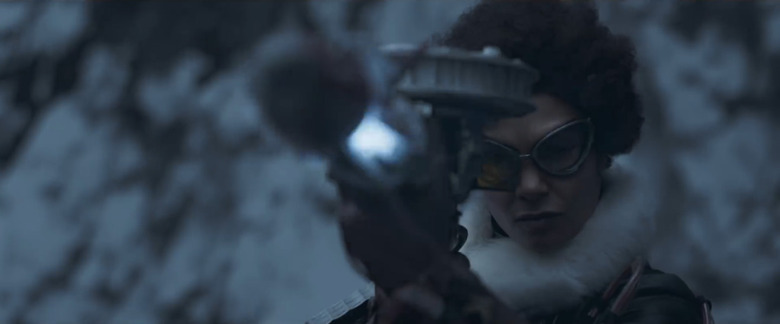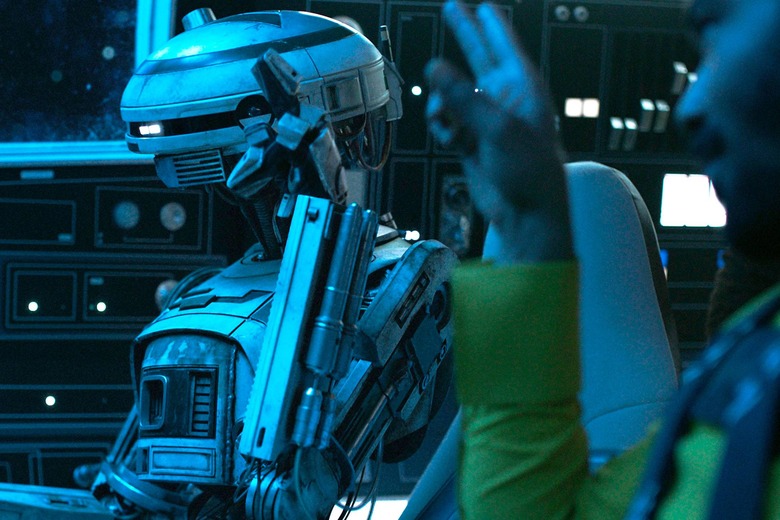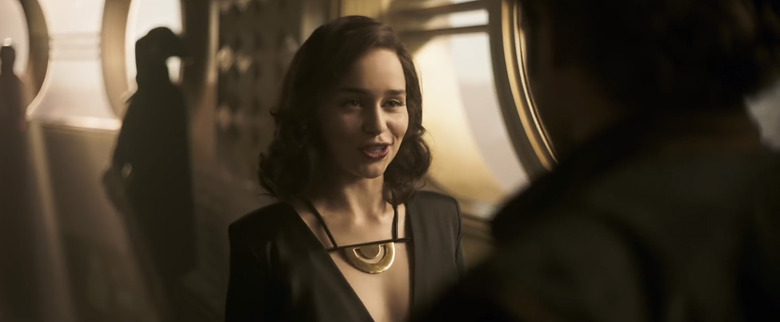The Women Of 'Solo: A Star Wars Story' Deserved Better
(Welcome to The Soapbox, the space where we get loud, feisty, political, and opinionated about anything and everything. In this edition: despite the best intentions of everyone involved, the women of Solo: A Star Wars Story get the short end of the stick.)
Rey. I think about her a lot. A beacon of hope in a fandom so punctuated by masculine energy. There is Leia, yes, a feisty ball of purely female spitfire, a woman who lit a spark in the original Star Wars films and who lives inside every girl of a certain age even still. But Leia was never our focal point, and Rey is. The new dawn of Star Wars entered stage left with a message loud and clear: there are other kinds of heroes in this world, and this is what they look like.
The Disney era of Star Wars is not without its setbacks, but the women have been across-the-board fantastic from the perspective of this lifelong female fan. Rey, Jyn, Holdo, Rose, the return of Leia as a general; strong signals in a hellfire of war and famine and the disturbance of peace. Trailblazers who will not be silenced no matter the boycotting hashtags or insular vendettas. To us, the women who love these movies, they are setting the stage for a new kind of intersectional fandom inclusion.
I had my reservations about Solo: A Star Wars Story, but was excited to see what it might do with its troupe of new female characters. Qi'ra, L3-37 (the first female droid with a major role in Star Wars history), Val. The marketing made them look distinctly impressive, with new energies to bring to what could otherwise be a very male-heavy narrative.
Unfortunately, with some minor exceptions, I was largely disappointed by the treatment of these characters, their roles in the universe, and the larger implications of what it means when Star Wars films are only ever written and directed by men. Which isn't to say men haven't written compelling and important women already in the canon. George Lucas created Princess Leia, J.J. Abrams and Lawrence Kasdan created Rey, and Rian Johnson added delicate touches to her that deepened her emotions and centered her motivations. But that doesn't mean we couldn't use a little freshening in that department, and Solo reminded me how mistreated women can be in the hands of all-male creators. It's not always intentional, but it often teeters – incidentally – into stereotype.
Let's break down the women of Solo: A Star Wars Story and get into some of their strengths and weaknesses as characters.
Spoilers begin now.
Val
Thandie Newton is on a winning streak right now. As Maeve on Westworld, she plays an android who demands agency, a woman created to be mistreated who is finally having her revenge. The role earned her a cadre of awards nominations, and has made her a highly recognizable face in the nerd circuit. She was one of the biggest question marks heading into Solo, as she appeared only briefly in the trailers and without much in the way of marketing. All we knew was that she was rocking a '70s 'fro and looked appropriately vintage Star Wars.
We learn right away that Val is actually the wife of Woody Harrelson's Tobias Beckett. The two are criminals and smugglers with no allegiance to any side but their own: Han Solo prototypes, if you will. Val and Tobias have a fun rapport, and after begrudgingly taking in Han and Chewie, serve as mentor figures. Their relationship is mostly there to serve as a foil for Han's love of Qi'Ra; Beckett tells Han to "trust no one," who then points out how much he trusts and loves Val. Han aspires to the same type of relationship, something on-the-run, exciting, and limitless.
But Val doesn't go very far. Shortly into the movie, she sacrifices herself to save the rest of her crew on a heist-gone-wrong. Beckett is temporarily devastated, but ultimately, Val's death means little to the story. It's never really brought up again in a significant way, it doesn't have any bearing on the story, and it has about the same emotional resonance as the death of Jon Favreau's alien, Rio Durant.
It's a really egregious and unfortunate case of "fridging," a term created by comic writer Gail Simone that defines the trope of women who die to motivate male arcs. Here's a YouTube video that shows just how persistent this trope is, specifically in genre media.
All of this is made worse by the fact that Val is a woman of color, and representation of non-white characters is already feeble in Star Wars. Thandie Newton had a lot of fun with the role in her brief runtime, but it's a crime against the film that Val was so undervalued and underutilized. She's there solely to make Han and Beckett have something to argue about. Star Wars can do better than that.
L3-37
I wanted to love L3-37, the feisty droids' rights activist and co-pilot to Donald Glover's smooth-talking Lando Calrissian. We're introduced to the droid in the middle of her trying to liberate two gonk droids warring for sport. Droids, she argues, are slaves to human and alien masters, though she doesn't seem to think of herself as one. That clashing of ideologies set up a weird tone for a character I wanted to love, if only because she's portrayed by the supremely talented Fleabag and Killing Eve creator Phoebe Waller-Bridge.
There are several things about L3-37 that trouble me. First and foremost is that her angry activism is played for laughs; Solo never provides the proper safe space for her protestations to feel validated. Female anger is a powerful tool when wielded correctly and for the right reasons, but the tone here feels off, as if the film is having a laugh at the expense of her emotions, insomuch as a droid can feel and think freely. There were moments where it felt like the script was purposely telling the trolls who shout "SJW" on Twitter that they were right all along, that women are nothing more than robots spouting off what they've been programmed by the media to believe.
And then there's the issue of L3's sexuality. Her belief that droids are slaved and mistreated complicates her relationship with Lando, and makes her comments about her ability to have sex with him deeply upsetting. Her desire for sex gets into weird territory right away, and points out something glaring and problematic. As YouTuber Jenny Nicholson points out, "Droids are always boys unless they're midwives, flight attendants, or an SJW a male character canonically had sex with."
Droids are always boys unless they're midwives, flight attendants, or an SJW a male character canonically had sex with, yas girl slay
— Jenny Nicholson (@JennyENicholson) May 25, 2018
Ultimately, L3-37 feels like a jab at feminism and activism instead of a commentary on it. Qi'ra doesn't take her seriously, nor does anyone else. Even worse, she's also fridged the same way Val is; she "dies" so that Lando can feel bad, and so that her consciousness can be downloaded into the Falcon. Her worst fear – servitude – is manipulated, her agency removed; she is forevermore the ghost of what she once was, her personality stripped away from her.
Qi’ra
Qi'ra is the least problematic of the female leads, and the only major one who walks out of the movie unscathed. (There is also Enfys Nest, who is cool as hell but more of a symbol than a character.) There are no immediate problems with the character as she exists; she's a turncloak, yes, but it's well laid out, and doesn't rob her of a compelling arc or development. If anything, she's the most interesting thing about Solo, a wholly original character who is worked into the canon in a believable, exciting way.
But I do take issue with the ways in which the movie refuses to engage with the horrible things happening to Qi'ra. Take, for instance, her relationship with Dryden Vos (Paul Bettany), a crime boss in the Crimson Dawn syndicate. Qi'ra is, essentially, his prisoner, though he lovingly refers to her as his "lieutenant;" she's dressed in seductive high-society wear, and Vos slinks his hands all over her. She's not a mob wife so much as a mob sex slave, and though she's highly aware of how much of herself has been compromised to survive, it doesn't placate that reality. We're never told explicitly what Qi'ra must do to please Vos and hold her rank, but it's implied.
Unfortunately, Han is less concerned with what was likely years of abuse and manhandling – not to mention a horrible life on the streets leading up to that – and more concerned with getting back into Qi'ra's pants. He canoodles with her in Lando's cape room on the Falcon, without asking if it's okay, without wondering how her body might have been mistreated in the years since they last met.
The movie doesn't make a big to do with this, and I'm sure the male screenwriters – however well intentioned – didn't think much about the implications of Qi'ra's situation the way a woman creator might. Women know that other women don't willingly enter crime syndicates where male superiors dress them up and train them and force them to serve drinks at fancy parties without doing other unspeakable things to them behind closed doors. A woman might make Qi'ra a little more on edge in romantic situations, and a little less excited about climbing the ladder the second her boss is dead. Qi'ra working with Maul is a fun twist, but she is still underneath the beck and call of a destructive and powerful man, one who – in their final conversation – says with a predatory tone that they'll be working more "closely."
Qi'ra is more powerful than she lets on, and I don't fault the film for where she ends up; victims of abuse are often conditioned to expect nothing else. That she is able to rise up the Crimson Dawn ranks is a testimony to her strength and prowess. But I do wish the men around her showed a little more compassion, or that the film had engaged more with the things she whispers about having done in her quest for survival.
But as with her fellow Solo ladies, she is at the mercy of men – both on page and on screen. I hope, going forward, Lucasfilm considers a more diverse palette of creators to prevent these sorts of missteps.



